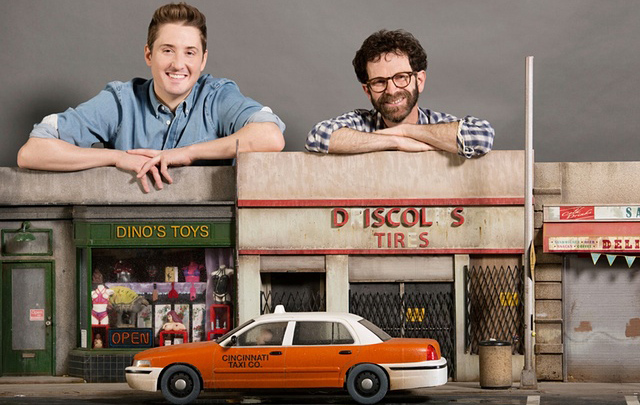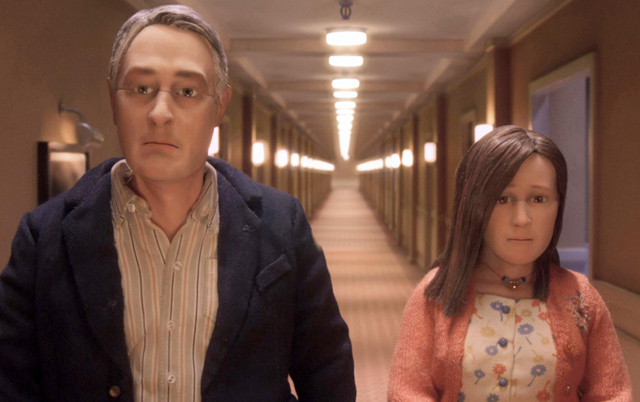CHICAGO– Charlie Kaufman is one of the most inventive and creative minds in film – he has written “Being John Malkovich,” “Eternal Sunshine of the Spotless Mind” and “Adaptation.” He recently teamed up with an animation director, Duke Johnson, to produce an unusual and contemporary stop-motion film, “Anomalisa.”
The use of stop motion in “Anamolisa” is much more poignant and philosophical than any other of these types of animated films before it. There is a customer service expert named Michael Stone (voice of David Thewlis), who experiences his life as mind-numbing sameness. Every man and woman sounds exactly the same (voice of Tom Noonan), until he meets a nebbish convention attendee named Lisa (Jennifer Jason Leigh). The film is a meditation on how life, at times, can be a mystery that needs to somehow be unlocked. The world can spin the same on a daily basis, yet there are those nuggets of consequence that exist, if we allow ourselves to indulge them.

Co-Directors Duke Johnson (left) and Charlie Kaufman of ‘Anomalisa’
Photo credit: Paramount Pictures
This is a typical type of theme in a Charlie Kaufman film – he is celebrated for his innovative approach to storytelling – and he participates as both screenwriter and co-director. Born in New York City, and a graduate of New York University, he first wrote professional scripts for the 1991 TV series, “Get a Life.” After a few TV gigs throughout the 1990s, his screenplay of “Being John Malkovich” (1999) was directed by Spike Jonze. He subsequently penned “Adaptation” (2002), “Confessions of a Dangerous Mind” (2002) and “Eternal Sunshine of the Spotless Mind” (2004), before writing and directing “Synecdoche, New York” in 2008. “Anomalisa” is his seventh feature film as writer, and his first animated film.
Duke Johnson is the co-director of “Anomalisa,” and he cut his teeth in television, directing and producing “Mary Shelley’s Frankenhole” for Cartoon Network’s Adult Swim. HollywoodChicago.com spoke to both creators of the new animated release, in a free-wheeling forum that would be right at home in a Kaufman movie.
HollywoodChicago.com: Were you guys talking about life or death in this film? Is it the conveyor belt of dread that is our lives or the hope that we can always find something?
Charlie Kaufman: We don’t talk about what the movie is about, we want you to figure it out for yourself.
Duke Johnson: And it was such a beautifully prepared question as well.
Kaufman: People come up to us and say many different things to us regarding what’s it about. For us to say anything specific, and go on the record, then does every other interpretation get invalidated? In general, the one that I think is great is, ‘thank you for making a movie about…and then they fill in the blank.’ I would never say that anything is wrong.
HollywoodChicago.com: The other day I was talking to some people regarding how, in a sense, we are as human forms all commodities in our first world situations? What are the expressions of that sense in ‘Anomalisa’?
Kaufman: You’re going to keep doing this, aren’t you? [laughs]
Johnson: We’ve talked about this before, that in a sense the people we interact with have labels in these interactions – like customer service representative, waiter, clerk…
Kaufman: That’s not who they are, that’s how we see them. You see them as their job description, and they see you as a problem you have to solve as a customer. There is an antagonism built into that interaction, because no one is fully recognizing anybody else.
HollywoodChicago.com: The detached jaws of the animated characters was a specific style choice. How did that style relate to the story you were telling?
Johnson: Early on we were discussing how the puppets would function, and how we’d be able to get a high level of detail in the facial performance. This is style of animation that is typically used, and we soon integrated that style into our storytelling. There is a brow piece and a mouthpiece, and there are hundreds of different replacements for both, so the eyebrows and the mouth can create an illusion of movement.
Kaufman: And the expressions are constantly being swapped out, practically one per frame, and it’s all put together to make it look like a moving face.
Johnson: Generally the lines separating the two pieces are digitally brushed out, but we decided not to do that in our movie.
HollywoodChicago.com: Michael Stone is a character, as you interpreted it, that everyone wants, but why seems to be unclear. Is this a political statement, as in leadership is nothing but platitudes, a certain amount of wealth and followers?
Kaufman: He’s a celebrity in a very small world, and everyone is interested in him because it’s their job to be interested in him. He has an identity as a guru to these conventioneers, but he can’t handle people, or manage relationships.

Stop Motion Characters Michael and Lisa in ‘Anomalisa’
Photo credit: Paramount Pictures
HollywoodChicago.com: Charlie, I’m interested in how you have viewed the historical and cultural signifiers in the generation that you came of age in. What was in the landscape that you believe, in combination with your education and environment, that gave you your particular point of view?
Kaufman: My point of view comes more from the literature I’ve read and the comedy of the era. When I was a kid, coming across National Lampoon Magazine, that was a big thing. I suddenly felt like there were other people that felt the way I did, and there was a way of expressing and communicating this worldview. That led me to Monty Python, literature and theater, and historical things like Watergate were in the background. Even as I was in Junior High, I wasn’t sure if I wouldn’t be drafted. I even had figured out an escape route. [laughs]
HollywoodChicago.com: Duke, you worked in animation with ‘Moral Orel’ and ‘Mary Shelley’s Frankenhole.’ How did those looks evolve into how you specifically wanted the stop motion look of ‘Anomalisa’ to play out?
Johnson: The look of ‘Anomalisa’ is not relevant to my previous TV work. Those shows were more about broad comedy, and they were more traditionally animated. ‘Frankenhole’ was inspired by paper puppetry, for example. The film was more about emotion..,.
Kaufman: We were looking to do something that was naturalistic and nuanced, so they would reflect the emotions that were expressed in the script, and how the actors performed it in the recording of the voices.
We wanted to do realistic puppets, we sculpted them based on real people. The character of Michael is based on Duke’s ex-brother-in-law, Lisa is based on a woman spotted in a bar in Los Angeles. We spent a lot of time on the eyes, to make them look alive. And instead of the usual stop action look, we made them into more human proportions. We wanted more subtlety.
Johnson: There was definitely an evolution based on my progression in working with this type of puppetry, but aesthetically it was a whole different ballgame.
HollywoodChicago.com: Charlie, you deal with schizophrenia in many of your screenplays. Since a writer essentially creates other parts of themselves by creating characters and environments, how do you personally deal with the moral position of ‘the thing that makes you great also has the power to destroy you?’
Kaufman: I just try to be honest, because I think that’s part of my job description as a writer. I try to present something that is true so I don’t further destroy the world with my contribution to it. [laughs] There is so much crap in the world, both in show and other businesses, that I try to be vulnerable myself, in the hopes that there is some truth I can get to, that makes people feel less alone in the world. – even if the theme is loneliness.
HollywoodChicago.com: Which of the characters you created would you like to have a conversation with, and which ones would you avoid?
Kaufman: I feel like I’d want to have a conversation with all of them. I write them from the inside, so I’m not trying to judge them. Who would I like to avoid? I don’t think anyone, even Donald [Kaufman’s twin brother character from ‘Adaptation.’]. I even would like to meet him someday. [laughs]
 | By PATRICK McDONALD |